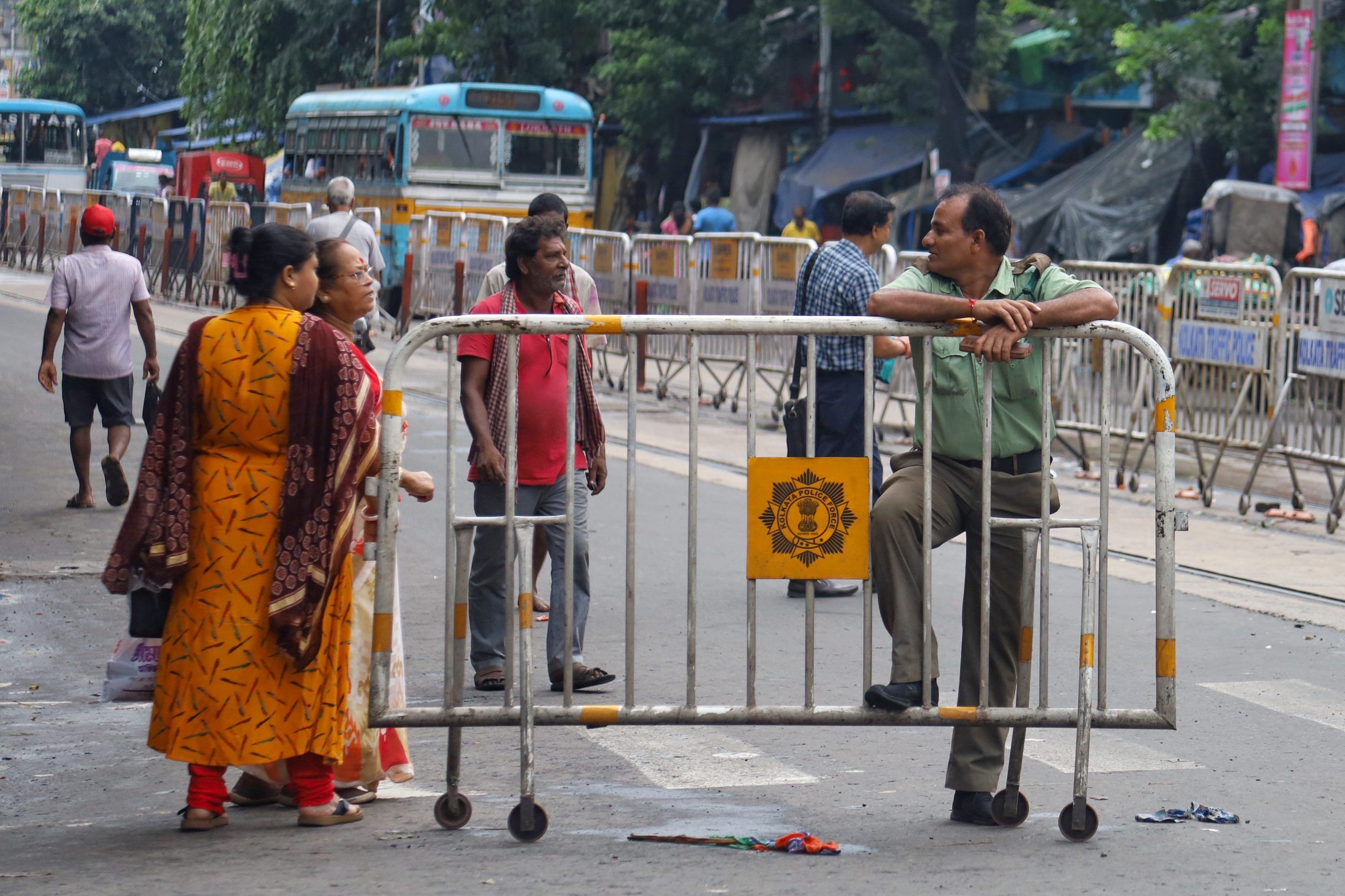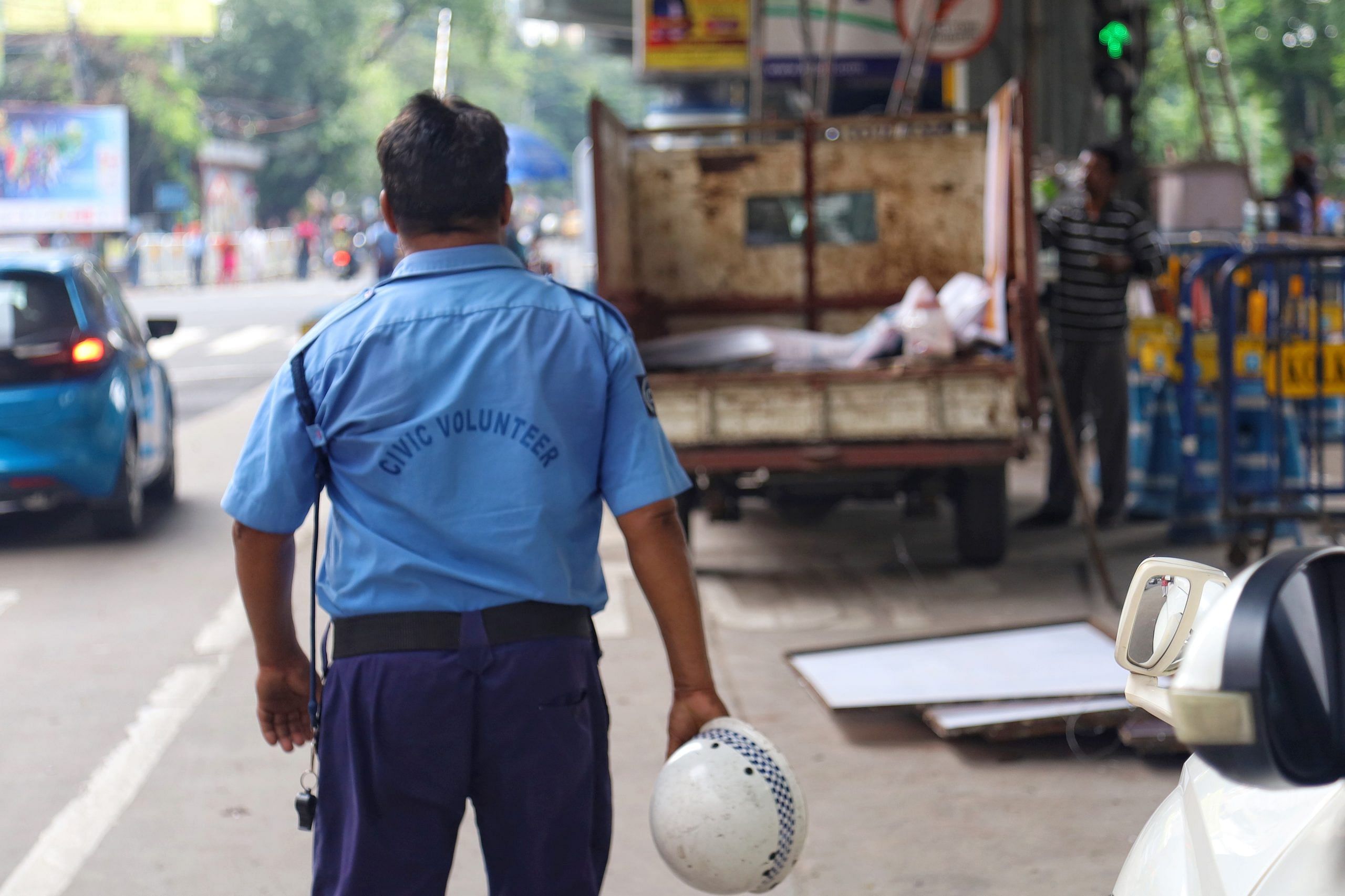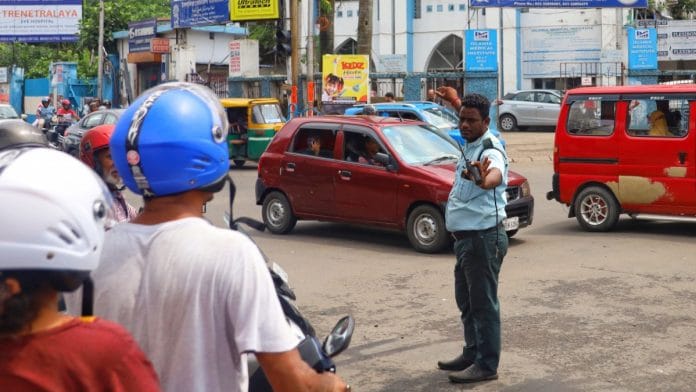Kolkata: The rape-and-murder of a trainee-doctor inside the premises of RG Kar Medical College and Hospital over two weeks ago has brought under scrutiny the unique West Bengal Police scheme of civic volunteers who assist them in managing traffic, ensuring public safety, and controlling crowds during festivals.
Sanjoy Roy, the primary suspect in the RG Kar case case, was a civic volunteer. He had allegedly snuck into the seminar room on the third floor of the chest medicine department of the hospital in the dead of night on 9 August, when the 31-year-old junior doctor was resting, to commit the crime. Roy is currently in judicial custody.
Following the incident, Kolkata Police is, for the first time, preparing a centralised database containing details of all the civic volunteers who have been recruited.
But civic volunteers on the ground resent that the entire force is being held responsible for one bad incident.
The genesis of the concept was well-intentioned—providing a regular source of income to unemployed youth. Initially, it was implemented on a small scale back in 2008 under the government of the Communist Party of India (Marxist), or CPI(M).
At the time, there had been a shortage of manpower in the police force, which was impacting day-to-day policing. The decision was made to rope in civilian volunteers on a contractual basis to fill the gap. Their mandate was to assist the traffic police in manning busy intersections.
“It served two purposes. First, it took some of the burden off the overstretched police and second, because they were not permanent employees, the financial burden on the government was limited and the wage bill did not go up substantially,” said a former West Bengal director general of police (DGP) on condition of anonymity. He was serving in the Kolkata Police traffic department when the scheme started.
The volunteers were initially given an honorarium of Rs 141 per day or Rs 4,080 a month. This has now been increased to Rs 9,000. They also get medical insurance and ad-hoc bonuses from time to time.
They are enlisted at thana (police station) level at a lower rank on a ‘no work, no pay’ basis and receive a 25-day basic training in traffic control and crowd management before they begin.
However, what started as a way to effectively deal with manpower issues has, over time, become a potent tool in the hands of the party in power, serving and retired West Bengal cadre IPS officers told ThePrint.
“The civic volunteer scheme became a tool for the political masters to reward their party’s loyal foot soldiers across the state. The job did not require any specialised skill and assured a regular monthly income,” the retired DGP quoted above told ThePrint. “It gave the ruling party a good opportunity to support its grassroot workers—poster boys, flag bearers, and slogan shouters.”
A former inspector-general of police (IGP), who retired from West Bengal Police in 2022, said that ambiguity of the scheme made it easier to misuse.
“There are no pronounced recruitment rules….Everything is ad-hoc, which helps in obfuscation,” the former IGP said.
A 2021 National Human Rights Commission report that looked into post-poll violence in West Bengal said that, despite providing employment to a large number of people, the scheme suffered from “inherent limitations”, such as inadequate training and absence of career progression for civic volunteers.
“Civic volunteers, as found in a large number of police stations, are locally employed young boys who have neither been regularly recruited nor given any training like regular constables and, hence, they are neither effective nor capable of handling crime or law-and-order situations,” the report said.
It further added that these civic volunteers are “generally perceived to be agents of the ruling party as they were recruited during the tenure of the AITC (All India Trinamool Congress) and maintain touch with the local party leaders”.
The origin of the Green Police
The whole concept had an innocuous start under the CPI(M) in 2008. The Kolkata Police received a proposal from Hyundai Motors and Bharat Cements to put about a dozen college students as volunteers on some of the busiest intersections around Park Street to assist the traffic police.
According to the proposal, the volunteering would last three months, students had to come in twice a week for two hours each during the morning and evening hours, and volunteers would be given a small stipend.
The then Kolkata mayor was particularly enthused by the idea of roping in civilians to assist the police. A proposal to draft 500 unemployed youth, who would be attached to different police stations, was put together. The minimum education qualification was low—the volunteers between the age group of 20-30 only needed to have cleared Class 8.
Their mandate, in the initial years, was to keep an eye on and report any illegal felling of trees, remove illegal hoardings, and assist traffic police in manning busy intersections.
When the first batch of civic volunteers joined, they were given the now-recognisable green uniforms, which gave rise to the moniker, “Green Police”.
Since 2018, they have also been wearing a blue uniform besides the old green one. “The newer recruits all wear the blue shirt with civic volunteer embossed at the back and navy blue trousers,” a traffic police personnel said.

Scheme scaled up under TMC
In 2012, with manpower shortages continuing in West Bengal Police, the scheme was scaled up, a year after the Mamata Banerjee-led Trinamool Congress (TMC) came to power for the first time after 34 years of Left rule.
The state government announced that the West Bengal Police would induct 1.25 lakh civic volunteers across the state to assist in policing. Currently, the number of such volunteers in the state stands at approximately 1.6 lakh.
Though the scheme started off well, complementing the state police, with time, rot set in, the former IGP quoted above said.
“There are complaints galore of civic volunteers indulging in fleecing drivers of commercial vehicles and other illegal activities. There is no accountability. If a civic volunteer is caught taking money, he is sent home,” he said.
The salary and other costs, like of the two uniforms, are borne by the state government.
ThePrint reached Rajesh Kumar Singh, West Bengal Additional Director General (Traffic), and Manoj Kumar Verma, ADG (Law and Order) for a comment. This report will be updated if and when a response is received.
Multiple raps by HC
While hearing a petition related to the recruitment of civic volunteers in Bankura in 2015, the Calcutta High Court on 29 April 2016 had said the process adopted by the government “seems to be a scam”.
Hearing the matter, Justice Sanjib Banerjee had said that the state government had adopted a “pick-and-choose” policy while recruiting civic volunteers in Bankura.
Following a directive from the court, the West Bengal police directorate finally issued guidelines defining the role of civic volunteers in March 2023. The guidelines mandated that civic volunteers would not be entrusted with any law-making duties.

‘Being unfairly blamed’
Many of the civic volunteers in Kolkata that ThePrint spoke to are unhappy that they are getting a bad name over one incident.
“This is unfair,” said 49-year-old Mohammed Aslam Mallick, a civic volunteer posted at Park Circus traffic intersection.
Mallick was recruited as a civic volunteer in 2013. “It’s not an easy job. We stand for 6 hours a day in the heat and pollution, helping people navigate the traffic. If something happens to us, we won’t get even a penny,” he said.
Mallick said the Rs 9,000 a month was not enough to run his family of three. “But, I don’t have a choice. I became a civic volunteer because I did not get any other job even after trying,” he said.
They said they are also forced to take up other work after their shifts to make ends meet. There are two shifts for civic volunteers: 8 am to 2 pm, and 2 pm to 8 pm.
“I work in a local unit, which makes jute bags, after my morning shift gets over. I earn another Rs 2,000 from there. I will not be able to run my family otherwise,” said another civic volunteer at Esplanade, who wished to not be named.
A senior state traffic police official said that it was wrong to label all civic volunteers as “criminals” after the RG Kar incident.
“They are a big helping hand to the traffic police. The crowd management that they do during Durga Puja is not easy. Handling hundreds of people throughout the day for 3-4 days is not easy. There are a few bad apples in every organisation but the entire civic volunteer force should not be given a bad name,” the officer said.
(Edited by Sanya Mathur)
Also Read: RG Kar Hospital’s resident doctors have deserted the campus. Those left behind are living in fear






